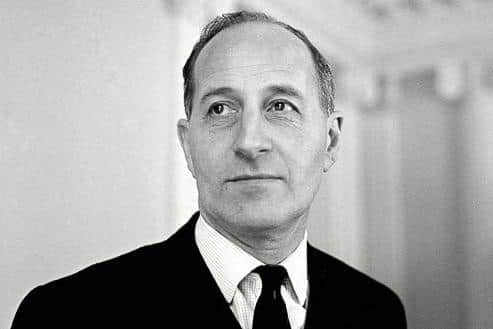What 1916 meant to NI PM Captain O’Neill (1966)
and live on Freeview channel 276
He remarked that 1916 meant not the Easter Rising in Dublin but the heroism of the Ulster Division at the Battle of he Somme.
O’Neill, who was speaking at the annual meeting of Fermanagh Unionist Association, said that in the past few weeks journalists from all over the world had visited him and asked what 1916 meant to him. And he said that that was the answer answer he gave them
Advertisement
Hide AdAdvertisement
Hide AdHe went on: “We in the Unionist Party are loyal British subjects, and this year of 1966 has a very solemn significance for us. On July 1, fifty years ago, men of the 36th (Ulster) Division attacked the Germans in the Thiepval area of France in the great Battle of the Somme. They won imperishable fame for their feats of courage, but their losses were terrible, and there was scarcely a family in Ulster which was not bereaved.


“It was indeed one of the greatest acts of statesmanship that the Ulster. Volunteers who had been formed, if need be, to fight against the British Government, in fact fought for their King and country and won imperishable fame.
“Today a tower stands at Thiepval as a memorial to our men who fell at the Somme, and on July 1 this year I look forward with pride and pleasure to leading a party of pilgrims - including many survivors of the battle - in a ceremony of commemoration there.
“Every year Somme ceremony is celebrated at the City Hall. This year it will be at Royal Balmoral. I hope as many of you as possible will flock to this great occasion when HM the Queen and HRH the Duke of Edinburgh will be there to help us celebrate the 50th anniversary. In this way you can show both your loyalty to the Crown and also your pride in the gallant men who made the supreme sacrifice.”
Bakery chief hints at dearer bread
Advertisement
Hide AdAdvertisement
Hide AdSir Archibald Forbes, chairman of the Spillers Flour and Baking Group, gave a hint during this week in 1966 that if bakers’ wages went up again the price of bread would also increase.
In his annual report to shareholders he says holding the bread price during the Prices and Incomes Board investigation report in January, meant “considerable financial sacrifice” for the company.
Recalling that a third report by the board on the wages situation was awaited - the January report had allowed an interim wages settlement and a penny a loaf price increase - Sir Archibald warned: “It is clear that the baking industry where the return on capital is accepted by the board to be abnormally low, cannot be expected to continue to meet rises in costs without some reasonable’ measure of recoupment in price.”
On the upward trend in world wheat prices, Sir Archibald said that the dominant factor in 1965 was heavy demand from the West.
Advertisement
Hide AdAdvertisement
Hide Ad“Russia’s harvest in 1965 is believed to have been only a little better than the disastrous one in 1963, while China is constantly in the market for all she can afford. Drought and the continuing rise in population have greatly increased India’s requirement compared with 1964.”
Comment Guidelines
National World encourages reader discussion on our stories. User feedback, insights and back-and-forth exchanges add a rich layer of context to reporting. Please review our Community Guidelines before commenting.